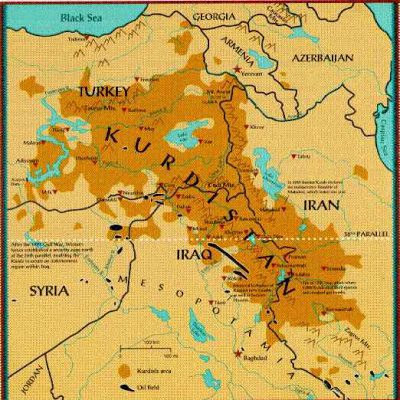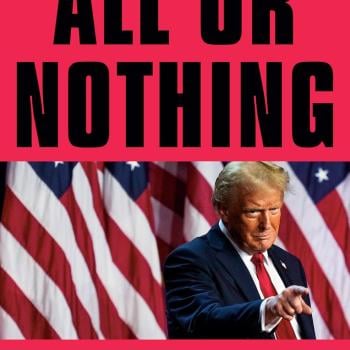 Six days ago, in defiance of the Iraq government, Iraqi Kurds held a referendum vote to secede from Iraq and form their own nation. The vote was an overwhelming 93% in favor of seceding. Iraq’s Prime Minister Haider al-Abadi condemned the vote. Turkey and the U.S. also ware against the referendum. It remains to be seen what will become of this Kurdish effort to form their own nation separate from Iraq.
Six days ago, in defiance of the Iraq government, Iraqi Kurds held a referendum vote to secede from Iraq and form their own nation. The vote was an overwhelming 93% in favor of seceding. Iraq’s Prime Minister Haider al-Abadi condemned the vote. Turkey and the U.S. also ware against the referendum. It remains to be seen what will become of this Kurdish effort to form their own nation separate from Iraq.
The Kurdish people live in Kurdistan–a name given to a sizable territory that includes northern Iraq, southeastern Turkey, and western Iran. These people have been bitter about what the Allied Powers did nearly 100 years ago following WWI. Until that war, all of the Middle East had consisted of the 400-year old Ottoman Empire. When the war started, in 1914, the Ottoman Empire chose to side with the Axis Powers in the war, the main one being Germany. The war ended in 1918, with the Allied Powers defeating the Axis Powers. The Paris Peace Conference was held in 1919-1920, and the Treaty of Versailles was signed.
The main Allied Powers were Great Britain, France, and Italy. They had to decide what to do with the now deceased Ottoman Empire. They formed the lasting League of Nations partly to deal with this matter. The League of Nations lasted 25 years to become the precursor of the United Nations that was formed at the end of WWII, in 1945. The United Nations therefore replaced the League of Nations.
At the Paris Peace Conference, the Allied Powers carved up the Middle East without caring enough of what its indigenous peoples thought. They divided the Middle East into what they called “mandates.” These were large parcels of territory the Allied Powers would help to become their own nations. Certain Allied Power nations were selected as “mandators” and given a particular mandate. For example, France was given the mandate over the land the Allied Powers called Iraq. Great Britain was given the mandate over the land they called Palestine, thus the Palestine Mandate. This particular territory encompassed all of today’s Jordan, Israel, and the UN-designated Occupied Territories of the Gaza Strip and West Bank that the Palestinians claim for their own.
The Kurdish people were very unhappy with the Allied Powers’ decision to divide the land especially into Turkey and Iraq. That is because most Kurds lived, as they still do, in northern Iraq and southeastern Turkey, with some in western Iran. Thus, Kurds were divided into these separate geo-political entities. They wanted their own nation. And they have wanted their own nation ever since. That is why the Iraqi Kurds’ referendum vote last Monday so strongly favored separation from Iraq with the hope that Kurds eventually will achieve their own nation.
The main city in Iraqi Kurdistan is Mosul, the second largest city in Iraq, with the Bagdad capital being the largest. Mosul is located on the western edge of the Tigris River on the southern edge of Iraqi Kurdistan. Directly opposite of Mosul, on the eastern side of the Tigris River, lies the ruins of the great, ancient city of Nineveh that the Bible tells much about and was the capital of the neo-Assyrian Empire at its height. This region is very rich in underground oil deposits. And there is a vibrant oil industry there. That is one reason the Iraqi government does not want this intended separation by the Iraqi Kurds. That is, it would not be fair to the remainder of Iraq’s population for the Kurds to gain such a wealth in natural resources for only themselves.
In recent years, the terrorist organization Islamic State (ISIS) has created great havoc in much of Iraqi Kurdistan by taking possession of certain regions, resulting in much killing. Just three months ago, in July, the U.S. coalition forces along with Iraqi forces drove ISIS out of Mosul and took possession of it. Half of ISIS’s war effort has been financed by stolen oil fields in northern Iraq and eastern Syria.
The ancient city of Ashur was located a few miles north of Nineveh. Obviously, the ancient nation of Assyria took its name from the city of Ashur. Assyria proper existed almost entirely in northern Iraq and a little in southeastern Turkey.
My interest in this Kurdish vote regards something in Bible prophecy, which I write books about. (See my Still Here series.) One of the great empires of the ancient world was the Assyrian Empire. The Neo-Assyrian Empire existed during the ninth through the seventh centuries. Isaiah the prophet lived in the eighth century. One of the my favorite verses is about the eschatological Day of the LORD, in which he spoke through Isaiah by saying of that time of worldwide peace, “On that day Israel will be the third with Egypt and Assyria, a blessing in the midst of the earth, whom the LORD of hosts has blessed, saying, ‘Blessed be Egypt my people, and Assyria the work of my hands, and Israel my heritage'” (Isaiah 19.24-25). I believe this prophecy indicates that Assyria proper will exist during the latter days prior to the end of this age. But there other several other biblical endtimes prophecies which suggest the same. See my post on this entitled, “Is the Formation of Assyria Near?”
There are also a significant number of people today who call themselves Assyrians. They are mostly professing Christians. They live in northern Iraq, but also in other regions of the world. I live in metro-Phoenix, Arizona, and there is a contingent of Assyrian people who live here. A large segment of today’s Assyrians hope and envision the reestablishment of the Assyrian nation where it used to be located, in northern Iraq. Maybe what the Kurds did last Monday will, likely over many years, develop into more than a Kurdistan, that is, into the future reestablishment of Assyria.

















